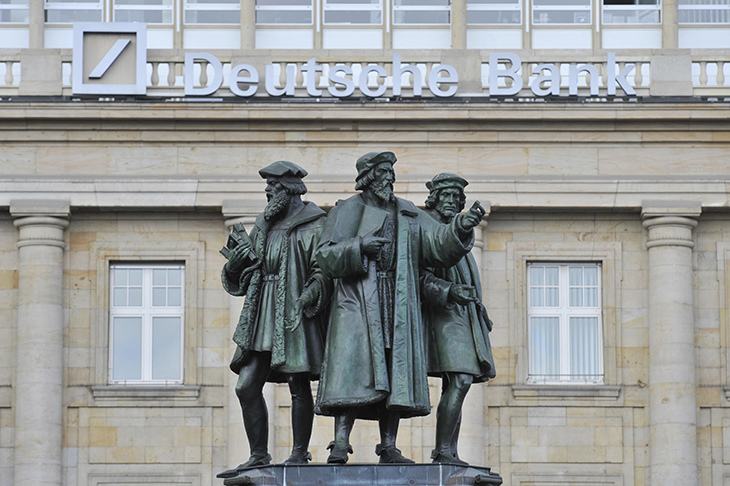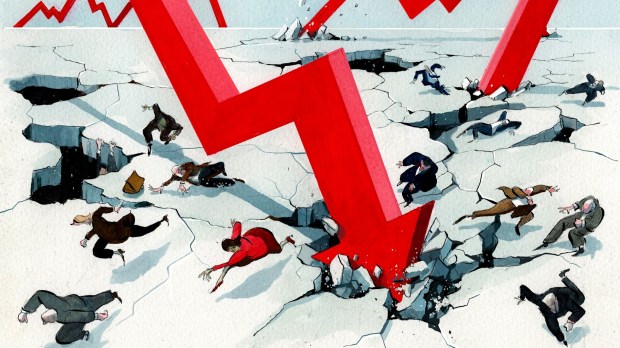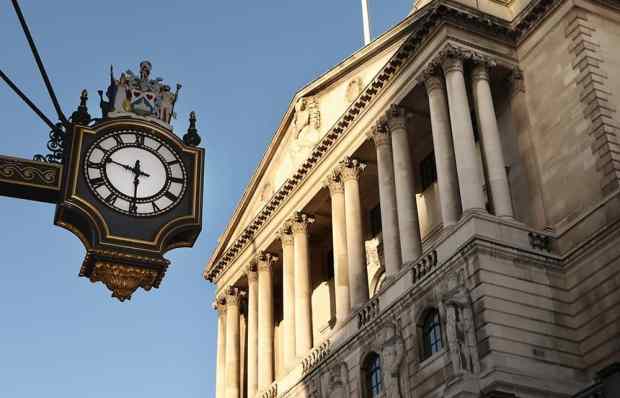Among the numbers attached to the restructuring of Deutsche Bank announced by Chief Executive Christian Sewing this week, the 18,000 job cull is most startling. But others tell the story just as vividly. First, the fact that the venerable institution, a pillar of Germany’s post-war economic resurgence, had raised €30 billion of new equity in the past decade in pursuit of a dream of becoming ‘Europe’s Goldman Sachs’ — but that sum is double its current shrivelled market capitalisation. Second, its most recent investment banking boss Garth Ritchie is leaving with an €11 million payoff, having collected ‘about €36 million’ over three years in which it became obvious his division was fit only for the axe.
Could there be a clearer parable of value destroyed and rewards misallocated in the mad financial milieu of the modern era? Deutsche shareholders are right to want their bank to return to its roots, financing German industry and commerce. But what an expensive way to learn the lesson that we should all stick to what we’re good at.
BP’s artful strategy
Carl-Henric Svanberg, the recently retired chairman of BP, once told me he had been surprised when he arrived from Sweden in 2010 to find the global oil giant so heavily involved in UK arts sponsorship. Since John Browne became chief executive 15 years earlier, the company had given millions to the British Museum, the Royal Opera House, the National Portrait Gallery, the Royal Shakespeare Company and other cultural beacons. But last month the actor Mark Rylance resigned from the RSC in protest at a link he said was helping BP ‘obscure the destructive reality of its activities’. And now an end to its association with the NPG has been called for by a clutch of Turner Prize winners led by Antony Gormley, who says ‘science tells us that BP’s business threatens our very way of life’.
BP would of course respond that it is doing its best to plot a long-term path to a lower-carbon future without destroying its own shareholder value and jobs, while keeping us supplied with vital fuel in the meantime; and that it is as advanced in this quest as any of the world’s other oil majors. But the truth is also that Browne’s strategy — which included abbreviating British Petroleum to BP and briefly suggesting the letters stood for ‘Beyond Petroleum’, as well as pouring cash into the arts — was a highly calculated repositioning of the brand. Those upmarket sponsorships were not altruism but a campaign to maintain the idea of BP as a British company in front of influential home audiences, while its Britishness was played down to the rest of the world.
Cynical or not, the strategy worked for a while, even after the Deepwater Horizon disaster. Now, arguably, BP’s sponsorships are little more than an invitation to virtue-bullying by Gormley et al and vandalism by Extinction Rebellion. Ironically, most investors probably agree with protestors that it’s vital to invest in next-generation renewable energy, disagreeing only about the practical pace of transition. But shareholders may also feel it’s time to slash BP’s arts budget, however many self-righteous actors and artists that puts out of work.
Wimbledon to Washington?
Bumping into former Bank of England governor Mervyn King at Wimbledon, I was keen to ask (but I didn’t) who he favours to succeed Christine Lagarde as managing director of the IMF in Washington if she replaces Mario Draghi as president of the European Central Bank in Frankfurt. An unexpected runner is George Osborne, whom Lord King famously criticised (according to US diplomatic emails leaked by WikiLeaks) for seeing economic issues only in terms of political advantage.
Then there’s King’s own successor, Mark Carney, whom EU chiefs with a hand in the IMF appointment are reportedly considering, and who needs a new job when he leaves London in January. But King also dissed Carney — a former governor of the Bank of Canada — by writing that ‘Canada has a small number of banks and is not an international finance centre’, which explains its ‘comparatively good performance… during the recent crisis’. So I’m guessing he won’t be backing either of them. But I hear that at 71 he still plays decent tennis as an All England Club member — so perhaps he should throw his own racket into the ring for the Washington job.
Lehman’s end
At last I’ve seen The Lehman Trilogy, a year after it opened in London but still with the original cast of Simon Russell Beale, Ben Miles and Adam Godley. Bag a ticket if you can: the run ends on 31 August. Ben Power (who adapted Stefano Massini’s Italian text) calls it ‘an epic theatrical poem’; it tells the history of Lehman Brothers from the arrival of Bavarian-born Henry Lehman in New York in 1844 to the collapse in 2008 of the high-rolling investment bank made by his heirs and successors. Except that — to my surprise — it compresses the final cataclysm into a brief tableau appended to a 200-minute performance that’s otherwise rich in narrative detail. Dick ‘the Gorilla’ Fuld, the hyper-aggressive Lehman chairman who led the firm to destruction, is given only a passing mention.
I wonder whether Massini and Power were warned off portraying living people who might still sue, or whether their message is that what matters is not the whodunnit of Lehman’s last days but the inevitability that an era of unhinged growth in financial trading would always lead to a crash. Either way, they could have borrowed a final scene from The Devil’s Casino, Vicky Ward’s account of the firm’s demise, which has Fuld watching powerlessly through a glass wall as the remains of his empire are broken up — while down on the trading floor, an angry employee defaces his portrait. If The Lehman Trilogy becomes a film, I modestly offer that as a better ending.
Got something to add? Join the discussion and comment below.
Get 10 issues for just $10
Subscribe to The Spectator Australia today for the next 10 magazine issues, plus full online access, for just $10.
You might disagree with half of it, but you’ll enjoy reading all of it. Try your first month for free, then just $2 a week for the remainder of your first year.















Comments
Don't miss out
Join the conversation with other Spectator Australia readers. Subscribe to leave a comment.
SUBSCRIBEAlready a subscriber? Log in